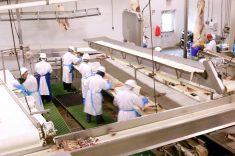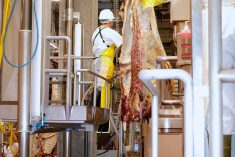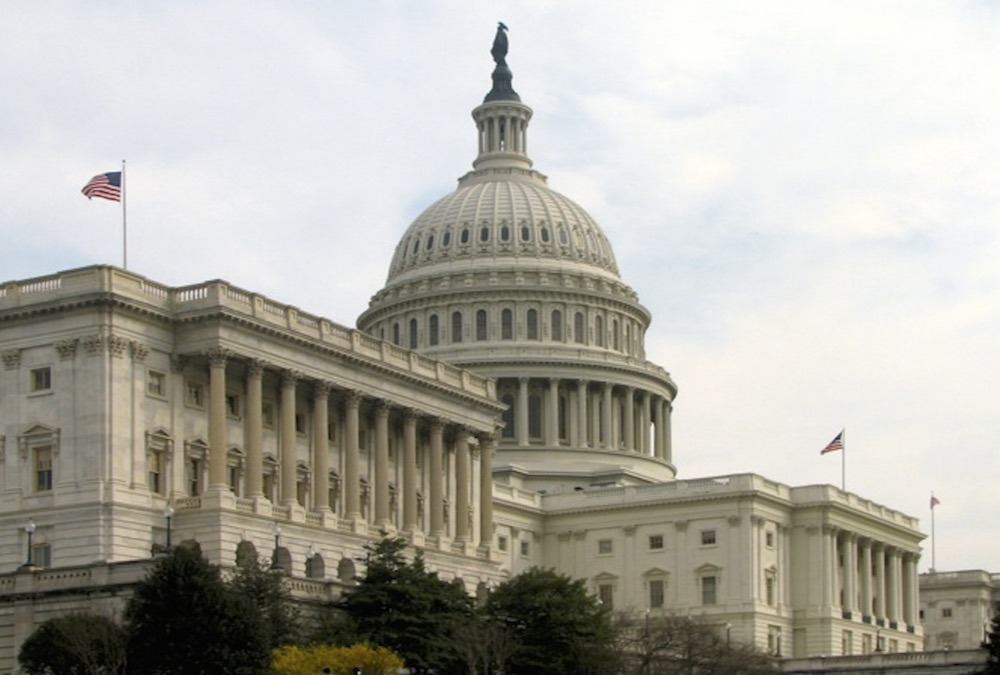I understand there has been talk of interprovincial inspection and beef sales in Canada.
There has been talk and legislation introduced to allow interstate meat sales down here but nothing has happened legislatively from that angle.
However, USDA does now have a program to assist existing smaller plants to upgrade facilities from state regulatory standards to qualify for federal meat inspection, the Meat and Poultry Inspection Readiness Grant (MPIRG) program.
The attention down here has been more on expanding capacity in smaller and medium-sized plants or building new plants, the Meat and Poultry Processing Expansion Program (MPPEP).
Local locker plants are having trouble getting enough help to handle more demand and have waiting lists of six months to a year for processing one or two head.
There are some smaller, 1,500-head/day plants under construction (Idaho) or in serious planning stages (Nebraska). But the millions of dollars in the infrastructure bill passed by Congress a few months ago are to be used for building new smaller plants. No funds were earmarked for expanding capacity at bigger plants.
Of course, there is little government knows how to do simply, except raise taxes. So there has to be help to figure out how to apply for government grants to build a plant. The Meat and Poultry Processing Capacity-Technical Assistance Program (MPPTA) is designed to help apply for grants, navigate application processes and provide technical assistance through government agencies, private sector experts, non-profit groups and universities.
Sometimes it’s hard to tell whether Congress realizes their lack of knowledge on an issue, is stalling because they fear they can’t really do anything useful or is just milking their time on stage for the cameras. The House has announced yet another hearing on competition in the beef processing industry.
According to the North American Meat Institute, that’s the seventh such hearing among multiple Congressional committees in recent times. There is no real new information the hearings could discover, except that voluntary efforts spearheaded by NCBA and state cattle producers’ groups have done more to increase the percentage of negotiated cash sales than many expected. Most, but not all, groups are satisfied with continuing those efforts and keeping government out of the fed cattle marketing business.
But not all politicians agree. The senators who last year introduced a bill that would mandate all major packing plants to procure at least 50 per cent of their fed cattle each week by negotiated cash and negotiated grid methods have amended their bill to utilize a somewhat different formula. Instead of a flat 50 per cent mandate — weekly — for each plant, they are calling for a minimum percentage, equal to the average in each region from 2020 to 2021. That means, what used to be the average, the midpoint, would now become a mandated floor. There are advantages to this approach, in not requiring the same percentage in every region, given the differing use of cash in different parts of the country, and variation due to pricing patterns and seasons.
But it would still be a mandate, still be the government tail wagging the dog, still be an attack on the very system of value-added rewards for better quality that has led Choice and Prime to 80 to 90 per cent of harvest and beef demand down here to the highest level in 33 years.
Speaking of tails wagging dogs, corporate raider Carl Icahn has — with the Humane Society of U.S. (HSUS) whispering in his ear — made demands of our country’s biggest fast-food chain and now, the biggest supermarket chain, on behalf of sows. At the behest of his daughter, who used to work at HSUS, Icahn began pressuring McDonald’s several years ago about the use of gestation stalls for sows for heat detection, breeding, monitoring and gestation nutrition. Sows spend 16 weeks in gestation stalls. There seems to be some confusion among activists, with some demanding “crate-free” production, meaning no gestation crates and no farrowing crates to protect piglets and workers as well as allowing workers to assist sows during farrowing.
McDonald’s has tried explaining to Icahn and activists that it doesn’t raise hogs and doesn’t control pig production but such realities don’t seem to faze activists, who disregard realities, animal nature and costs. McDonald’s has been working to source more pork from free-range production suppliers but really is constrained by the lack of available supply.
Such production methods are more expensive, more difficult to manage and present problems from hog behaviour considerations.
But McDonald’s only purchases one per cent of total U.S. pork volume. Kroger is a different story, with much higher volumes and a wider array of pork products. Icahn is petitioning for two directors on Kroger’s board and dragging along complaints about the gap between executive compensation and average Kroger workers.
The really good news about HSUS is that the Supreme Court of the U.S. has finally agreed to hear a case next fall against California’s Proposition 12 banning most pork sales from other states.
















